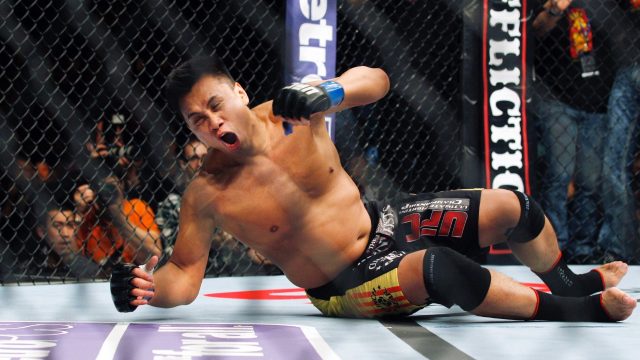
A proposed nine-figure agreement to settle antitrust lawsuits between former fighters and the UFC was rejected by a judge this week.
MMA journalist John S. Nash was first to report Judge Richard Boulware of the U.S. District Court of Nevada’s decision and that a tentative trial date has been set for Oct. 28 later this year.
The settlement reached back in March would’ve seen the company pay out $335 million to those involved, including more than 1,200 former UFC athletes.
One lawsuit was originally filed by Cung Le in 2014 (Le et al. v. Zuffa, LLC), which was later consolidated with other similar lawsuits, and Canadian fighter Kajan Johnson filed another lawsuit in 2021 (Johnson et al. v. Zuffa, LLC). The lawsuits initially sought up to $1.6 billion in total damages before the $335-million settlement was reached.
Representatives from the initial class action lawsuit claimed “the UFC used improper strategies to dominate the market for MMA fighter services, allowing it to pay its MMA fighters less than half as much as they otherwise would have received. The fighters also claim that the UFC violated the antitrust laws to the detriment of all MMA fighters.”
The UFC, which is owned by parent company TKO Group Holdings, Inc., released the following statement Wednesday afternoon in response to the ruling:
“We obviously disagree with this ruling and believe it disregards the expertise of counsel from both sides, as well as that of an accomplished and expert mediator – all of whom have decades of experience in antitrust case law.
“It prevents the athletes from receiving what they have argued is in their best interest and unwinds an extensively negotiated settlement that, in the plaintiffs’ counsel’s own words, ‘would far surpass the typical antitrust class action settlement’ and is an excellent result for the Settlement Classes by all traditional measures.’
“Additionally, by taking the unusual step of denying the settlement at this preliminary approval stage the Judge is also denying the athletes their right to be heard at this pivotal moment in the case.
“As we have said throughout this process, we believe strongly in the merits of our cases and are evaluating all our options – including, without limitation, an appeal – and have initiated discussions with plaintiffs’ counsel who have expressed a willingness to engage in separate settlement discussions for the Le and Johnson cases.”
While it is not the desired result the UFC was hoping for, it’s one that was always within the realm of possibility.
“Just because the parties agreed to the settlement doesn’t mean that they are just able to settle, because this is a certified class action and the court themselves must approve the settlement,” Erik Magraken of Combat Sports Law told Sportsnet in March when discussing the complexities of the lawsuit.
Boulware is expected to release a detailed written explanation that will expand on his decision in the days to follow.
The UFC (Ultimate Fighting Championship) recently released a statement following the rejection of the proposed antitrust settlement agreement by a federal judge. The agreement, which aimed to resolve a class-action lawsuit filed by current and former UFC fighters alleging anticompetitive practices by the organization, was denied by Judge Richard Boulware II of the U.S. District Court for the District of Nevada.
In their statement, the UFC expressed disappointment in the judge’s decision and reiterated their commitment to fair competition and the well-being of their athletes. The organization emphasized that they have always operated within the confines of the law and have never engaged in any anticompetitive behavior.
The lawsuit, which was originally filed in 2014, alleged that the UFC had created a monopoly in the professional MMA industry by engaging in practices such as exclusive contracts with fighters and restricting their ability to negotiate with other promotions. The plaintiffs argued that these practices had suppressed fighter pay and limited their opportunities for advancement in the sport.
Despite the setback of the rejected settlement agreement, the UFC remains confident in their legal position and is prepared to continue defending themselves in court. The organization has stated that they will vigorously contest the allegations made in the lawsuit and are committed to upholding the integrity of the sport of MMA.
The UFC’s statement also emphasized their ongoing efforts to support their athletes and provide them with opportunities for growth and success both inside and outside of the Octagon. The organization highlighted their investments in athlete health and safety, as well as their commitment to promoting diversity and inclusion within the sport.
Overall, the UFC’s response to the rejection of the antitrust settlement agreement reflects their determination to uphold their values and defend themselves against allegations of anticompetitive behavior. As the legal proceedings continue, it remains to be seen how this case will ultimately impact the future of professional MMA and the relationship between fighters and promotions.